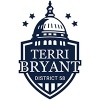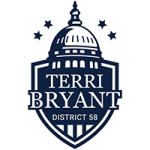On May 20, Senator Bryant spoke against Senate Bill 818, a sex education bill mandating that schools use radical sex education standards when teaching sex education. These standards, stretching from K-12th grade, were developed by outside special interest groups.
Senator Bryant noted that she doesn’t have an issue with medically accurate teachings happening in schools. What she does have a problem with is that this major overwrite of standards for sex education is inappropriate, controversial and frankly disturbing.
Proponents of the legislation tout local control with this legislation and argue that schools are not mandated to teach this curriculum, but according to Senator Bryant they fail to recognize their ALL or NOTHING approach. Either schools choose to teach these standards or they don’t teach sex education at all, which will undoubtedly leave countless children uninformed and unprotected.
As a mother and a grandmother, Senator Bryant said she was appalled that such perversion could be taught in our classrooms and saddened that children may be exposed to such age-inappropriate content.
Some of the contentious provisions that can be found in Senate Bill 818 include:
- Requiring kindergarten students to be taught about consent;
- Requiring second-grade students to define consent, reproduction, and gender identity, as well as identify different types of families, including cohabitating and same-gender;
- By fifth grade, students would be required to describe the role of hormone blockers, to distinguish between the sex assigned at birth and gender identity, define and explain differences between cisgender, transgender, gender nonbinary, gender expansive, and gender identity, and to be able to articulate that gender expression and identity exist along a spectrum;
- Language that deemphasizes that abstinence is the only 100 percent effective way to prevent STIs and pregnancy; and
- Requiring course materials to include local resources for reproductive health (including abortion providers), and prohibiting any instruction or materials in the classroom, including guest lectures, which might conflict with the provisions of the bill.
The legislation now heads to the Illinois House of Representatives for further consideration.

